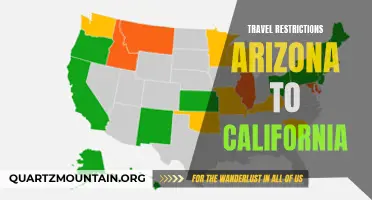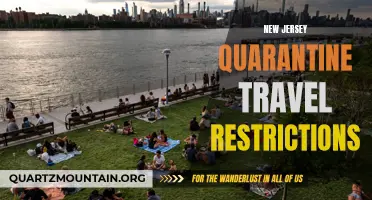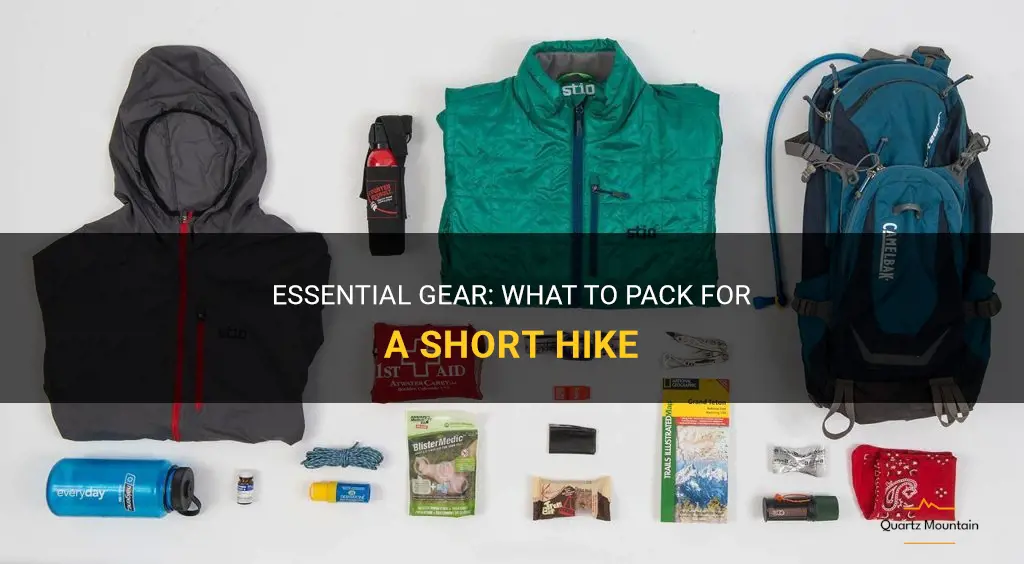
Are you planning a short hike and wondering what gear you should bring? Look no further! In this article, we will explore the essential gear you should pack for a short hike. From proper footwear to hydration and navigation tools, we will cover all the important items you need for a successful and enjoyable adventure in nature. So grab your backpack and let's get started!
| Characteristics | Values |
|---|---|
| Duration | Short |
| Distance | <5 miles |
| Terrain | Moderate difficulty |
| Weather | Check local forecast |
| Footwear | Hiking boots or sturdy sneakers |
| Clothing | Comfortable, moisture-wicking layers |
| Water | 1-2 liters |
| Snacks | Trail mix, energy bars |
| Sun protection | Sunscreen, hat, sunglasses |
| Navigation | Trail map, compass, GPS |
| Safety | First aid kit, whistle |
| Communication | Fully charged cell phone |
| Backpack | Small day pack |
| Optional | Trekking poles, insect repellent |
What You'll Learn
- What essential items should I pack for a short hike?
- Are there any specific clothing items or gear that are recommended for a short hike?
- Should I bring any food or water with me on a short hike If so, how much?
- What are some optional items that I could bring on a short hike to enhance my experience?
- Are there any safety precautions or emergency items that I should include in my pack for a short hike?

What essential items should I pack for a short hike?
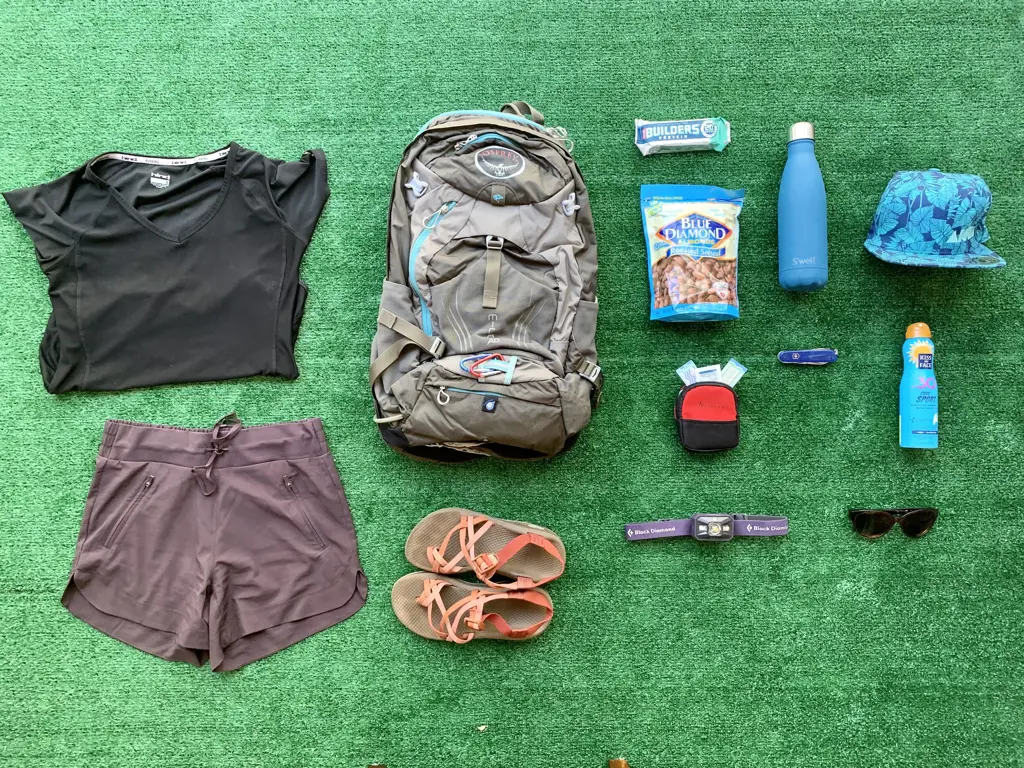
When going on a short hike, it's important to be prepared and pack the essential items that you'll need. Whether you're exploring a local trail or heading out for a day in nature, having the right gear can make your hike more enjoyable and safe. Here are some essential items to pack for a short hike:
- Proper footwear: Invest in a pair of comfortable hiking shoes or boots. They should have good grip and ankle support to prevent injuries on uneven terrain.
- Clothing layers: Check the weather forecast and dress accordingly. Layering is key, as it allows you to adjust your clothing as you warm up or cool down during the hike. Wear moisture-wicking materials to keep sweat away from your skin and prevent chafing.
- Water: Staying hydrated is crucial, even on short hikes. Pack enough water for the duration of your hike, and consider bringing a reusable water bottle or hydration bladder to reduce waste. Avoid relying on natural water sources for drinking, as they may be contaminated.
- Snacks: Pack high-energy snacks, such as trail mix, granola bars, or fresh fruit, to keep your energy levels up during the hike. Avoid foods that are high in salt or sugar, as they can cause dehydration.
- Navigation tools: Carry a map of the trail or use a GPS device to help you stay on track. Familiarize yourself with the trail and have a general idea of where you're going before setting off. It's also a good idea to have a compass as a backup.
- Sun protection: Protect yourself from the sun's harmful rays by wearing a hat, sunglasses, and sunscreen with a high SPF. Even on cloudy days, UV rays can still cause damage to your skin.
- First aid kit: Prepare a small first aid kit that includes essentials such as adhesive bandages, antiseptic wipes, pain relievers, and any necessary medications. Be sure to check the kit regularly and replace any expired items.
- Emergency whistle and flashlight: These items are important for signaling for help in case of an emergency or getting caught out after dark. Make sure the flashlight has fresh batteries.
- Insect repellent: Depending on the location and time of year, insects can be a nuisance during hikes. Apply insect repellent to exposed skin to avoid uncomfortable bites and potential diseases.
- Backpack: Choose a comfortable backpack with enough space to carry all your essentials. Look for one with supportive straps and multiple compartments to help distribute the weight evenly.
Remember, it's important to always be prepared for the unexpected when venturing out on a hike. Research the trail beforehand, let someone know where you're going, and never hike alone. By packing these essential items, you'll be well-equipped to enjoy a safe and enjoyable short hike.
Essential Items for a Memorable 1 Day School Trip
You may want to see also

Are there any specific clothing items or gear that are recommended for a short hike?
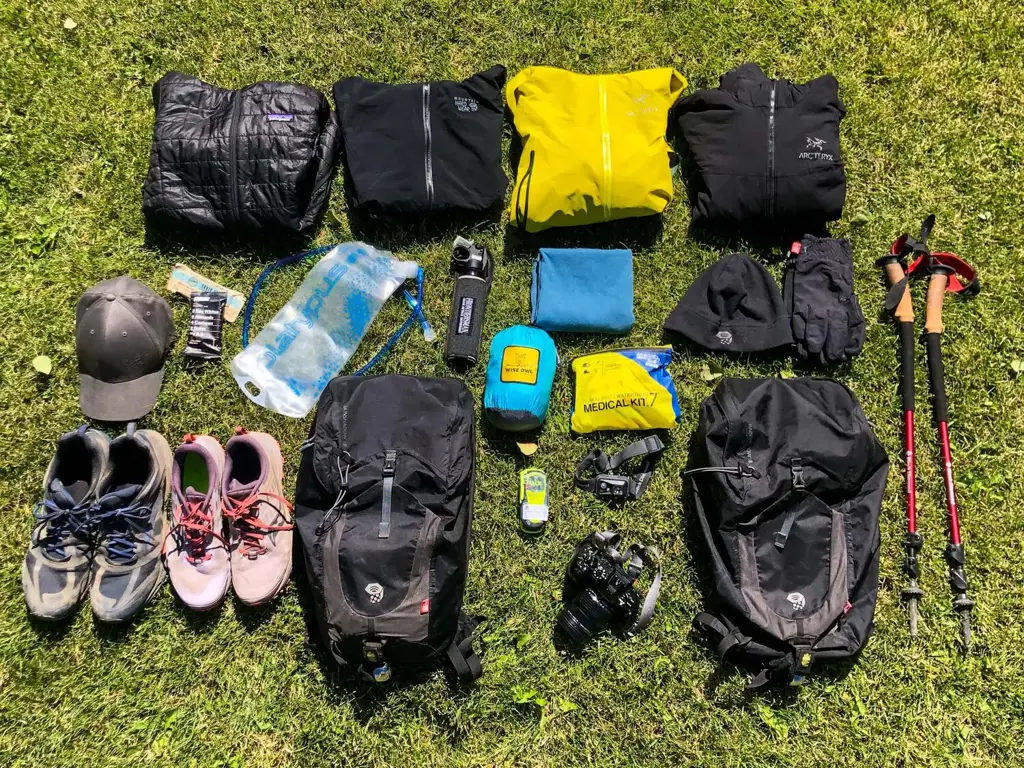
If you're planning to go on a short hike, it's important to have the right clothing and gear to ensure a comfortable and safe experience. While the specific items you'll need may vary depending on the terrain and weather conditions, there are a few key essentials that are recommended for any short hike.
One of the most important pieces of clothing for a short hike is a good pair of hiking boots or shoes. These will provide the necessary support and traction to help prevent slips and falls, especially on uneven or rocky terrain. Look for boots or shoes that are comfortable, water-resistant, and have a good grip on the soles.
In addition to footwear, it's also important to wear appropriate clothing layers for a short hike. Layering is key to staying comfortable in fluctuating temperatures and weather conditions. Start with a moisture-wicking base layer to keep sweat away from your skin. Avoid cotton, as it retains moisture and can make you feel cold. Instead, opt for synthetic or wool fabrics.
On top of your base layer, add a lightweight, breathable shirt or fleece for insulation. Choose a material that allows for breathability while providing warmth. Finally, bring a waterproof or water-resistant jacket to protect you from rain or wind. You never know when the weather can change, so it's always better to be prepared.
Along with clothing, it's also important to bring some essential gear for a short hike. A small backpack is a must-have to carry your water, snacks, extra layers, and any other essentials you may need. Look for a backpack that is lightweight, comfortable to wear, and has enough storage space for your needs.
Another essential gear item for a short hike is a hat or cap to protect you from the sun's rays. Choose a hat with a wide brim to provide shade for your face and neck. Additionally, wearing sunglasses and applying sunscreen can help protect your eyes and skin from harmful UV rays.
Lastly, always remember to bring a map and a compass or a GPS device to navigate your way on a short hike. Even if you're familiar with the trail, it's always better to have a backup method of navigation. It's easy to get turned around in unfamiliar terrain, so having these tools can ensure you stay on track.
In conclusion, there are a few key clothing items and gear that are recommended for a short hike. These include proper footwear, layered clothing, a backpack, a hat, and navigation tools. By ensuring you have these essentials, you can have a safe and enjoyable short hike, no matter the terrain or weather conditions.
Essential Items to Pack for Your Visit to Universal Studios
You may want to see also

Should I bring any food or water with me on a short hike? If so, how much?
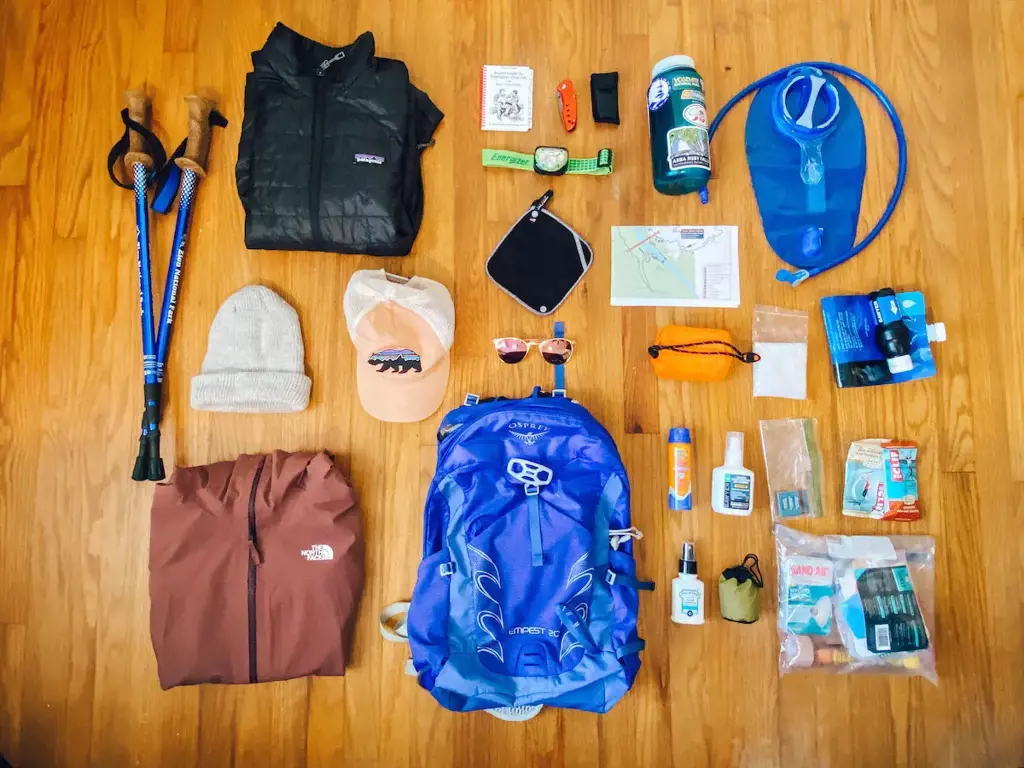
When it comes to hiking, it's always important to be prepared. Even on a short hike, it's a good idea to bring some food and water with you. While the actual amount you'll need will vary depending on factors such as the length and intensity of the hike, here are some general guidelines to keep in mind.
Hiking can be physically demanding, even on short trails. Your body will be working hard, and it's important to nourish it properly. Food provides the energy your muscles need, while water keeps you hydrated and helps regulate your body temperature. Without these essentials, you may experience fatigue, weakness, dizziness, or even heat stroke.
The amount of food and water you should bring will depend on the duration and intensity of your hike, as well as the weather conditions. As a general rule of thumb, it's a good idea to bring at least one liter (or 32 ounces) of water per hour of hiking. This will help ensure that you stay hydrated throughout your hike. However, if you're hiking in extremely hot or humid conditions or if it's a particularly strenuous trail, you may need to increase your water intake.
In terms of food, it's a good idea to pack snacks that are light, portable, and provide a good mix of carbohydrates, protein, and healthy fats. Examples include energy bars, trail mix, jerky, and nut butter sandwiches. Aim to eat something every 1-2 hours, depending on the duration of your hike. This will help maintain your energy levels and keep you fueled. It's also a good idea to bring some extra snacks in case your hike takes longer than expected or you encounter unexpected delays.
Other considerations
In addition to food and water, there are a few other items you may want to consider bringing on your hike. These include a first aid kit, a map and compass (or a GPS device), a hat and sunscreen, insect repellent, and a whistle. These items can help keep you safe and comfortable during your hike.
Remember, every hike is different, and it's important to tailor your preparations to the specific conditions of your hike. If you're unsure about how much food and water to bring, it's always better to err on the side of caution and bring a little extra. It's better to have too much than not enough.
In conclusion, bringing food and water on a short hike is a wise decision. It will help fuel your body and keep you properly hydrated. By following these guidelines and being prepared, you'll be able to fully enjoy your hike and stay safe along the way.
Essential Items to Pack for Navy Boot Camp
You may want to see also

What are some optional items that I could bring on a short hike to enhance my experience?
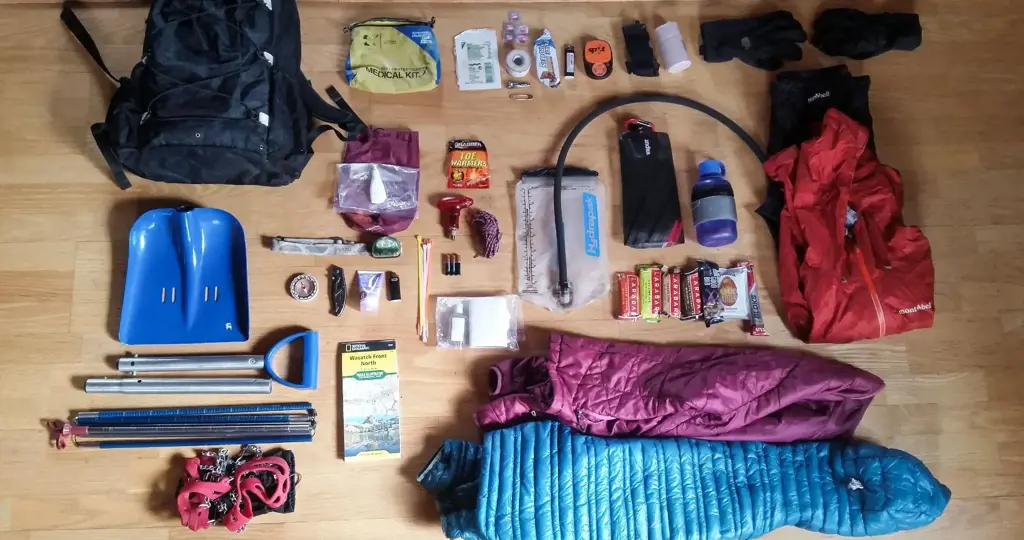
Going on a short hike can be a great way to enjoy nature and get some exercise. While the essential items for a hike are water, food, and appropriate footwear, there are also some optional items that can enhance your experience. These items are not necessary for a successful hike, but they can make your trip more comfortable and enjoyable. Here are some optional items that you could bring on a short hike:
- First aid kit: A small first aid kit is always a good idea. It should include basic supplies like band-aids, antiseptic wipes, and medical tape. Accidents can happen, and having a first aid kit can help you take care of minor injuries on the trail.
- Trekking poles: Trekking poles can provide extra stability and support on uneven terrain. They can help reduce the strain on your knees and provide balance as you navigate tricky sections of the trail. Trekking poles can be especially useful if the trail has steep inclines or descents.
- Insect repellent: Depending on the location and time of year, mosquitoes and other insects can be a nuisance on the trail. Bringing an insect repellent can help keep bugs at bay and prevent itchy bites.
- Sun protection: Sunscreen, a hat, and sunglasses are essential items to protect yourself from the sun's harmful rays. Even on overcast days, UV rays can still penetrate through the clouds. Applying sunscreen can prevent sunburn and reduce the risk of skin cancer.
- Binoculars: If you enjoy birdwatching or wildlife spotting, bringing a pair of binoculars can enhance your experience. Binoculars can help you see birds or animals that may be far away and difficult to spot with the naked eye.
- Camera: If you want to capture the beauty of nature and preserve memories of your hike, bringing a camera can be a great idea. Whether it's a smartphone, point-and-shoot camera, or a DSLR, having a device to capture photos can help you document your journey.
- Snacks: While it's essential to bring enough food and water, packing some extra snacks can be a nice treat during your hike. Granola bars, fruit, and trail mix are easy-to-carry options that can provide you with an energy boost when needed.
- Portable phone charger: If you rely on your phone's GPS or like to listen to music during your hike, bringing a portable phone charger can ensure that you have enough battery life. This way, you can use your phone without worrying about it dying halfway through your hike.
- Extra clothing layers: Weather conditions can change quickly, even on short hikes. Bringing extra layers of clothing, such as a lightweight jacket or a hat, can help you stay comfortable in case of unexpected temperature drops or rain.
- Field guide or nature book: If you're interested in identifying plants, flowers, or animals you encounter on the trail, bringing a field guide or nature book can be helpful. These resources can provide information and help you learn more about the natural world around you.
Remember, while these optional items can enhance your hiking experience, it's essential to pack wisely and not overload yourself with unnecessary gear. Consider the length and difficulty of the hike, the weather conditions, and your personal preferences when deciding what to bring. Ultimately, the most important thing is to enjoy your time in nature while staying safe and comfortable.
Essential Items to Include in Your Belize Packing List
You may want to see also

Are there any safety precautions or emergency items that I should include in my pack for a short hike?
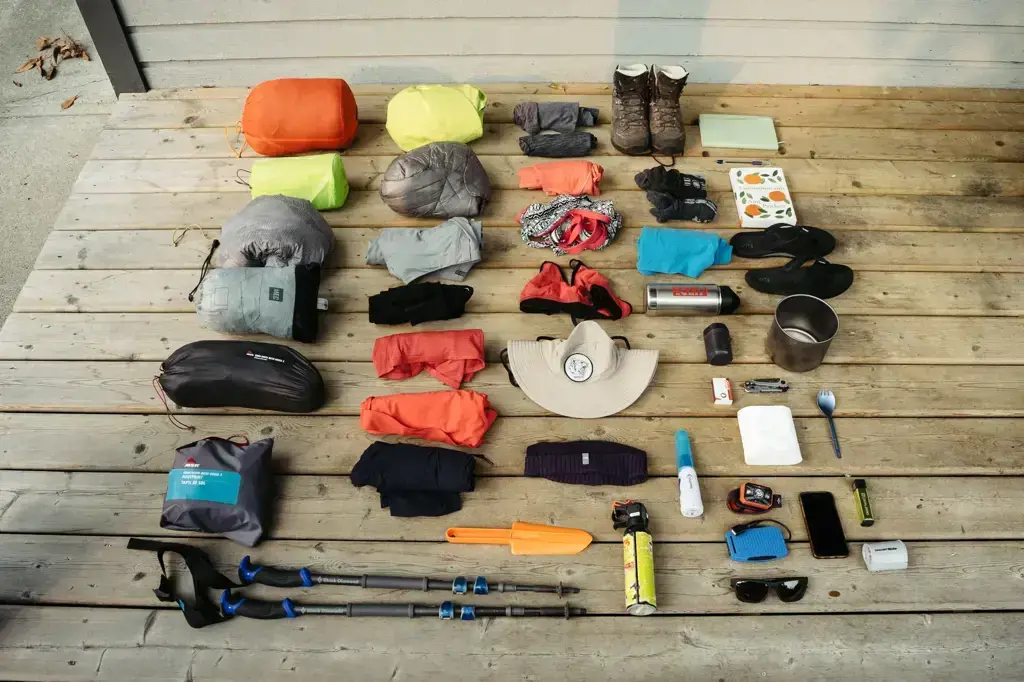
Going on a short hike can be a great way to enjoy nature and get some exercise. However, it is important to be prepared for any unexpected situations that may arise. By taking some basic safety precautions and packing a few essential items, you can ensure that your hike is both enjoyable and safe.
One of the first things you should do before going on any hike is to research the area you will be exploring. Find out the difficulty level of the trail, as well as any potential hazards or weather conditions you may encounter. This will help you determine what safety precautions and emergency items you will need to bring along.
One essential safety precaution is to let someone know where you will be hiking and when you expect to return. This way, if you do not return on time, someone will know to alert the authorities. Additionally, it is always a good idea to hike with a buddy, as having someone with you can provide an extra layer of safety.
When it comes to packing your emergency items, there are a few key things that you should always include. First and foremost, you should bring plenty of water and food. Even on a short hike, it is important to stay hydrated and nourished. Pack energy-rich foods such as granola bars, nuts, and dried fruit to provide you with the fuel you need.
A basic first aid kit is another essential item to have in your pack. It should include items such as band-aids, gauze pads, adhesive tape, antiseptic wipes, and any personal medication you may need. It is also a good idea to include a small pair of scissors and tweezers.
In case of an emergency, it is important to have a way to communicate with the outside world. Bring a fully-charged cell phone and a portable charger in case you need to call for help. It is also a good idea to have a whistle or a signal mirror as a way to attract attention.
Additionally, it is always a good idea to have a basic navigation tool, such as a compass or a map and a compass. Even if you are familiar with the trail, it is possible to get disoriented, especially in unfamiliar territory. Having a way to navigate can help you find your way back to safety.
Lastly, it is important to consider the weather conditions when packing for your hike. Dress in layers and bring a waterproof jacket or poncho in case of rain. Also, be sure to wear appropriate footwear and bring extra socks in case your feet get wet.
In conclusion, there are several safety precautions and emergency items that you should include in your pack for a short hike. By researching the area, packing essentials such as water, food, a first aid kit, a communication device, a navigation tool, and considering the weather conditions, you can ensure that you are prepared for any unexpected situations that may occur. Remember to always prioritize your safety and enjoy your hike responsibly.
Essential Items for a Two-Week Adventure in New Zealand
You may want to see also


